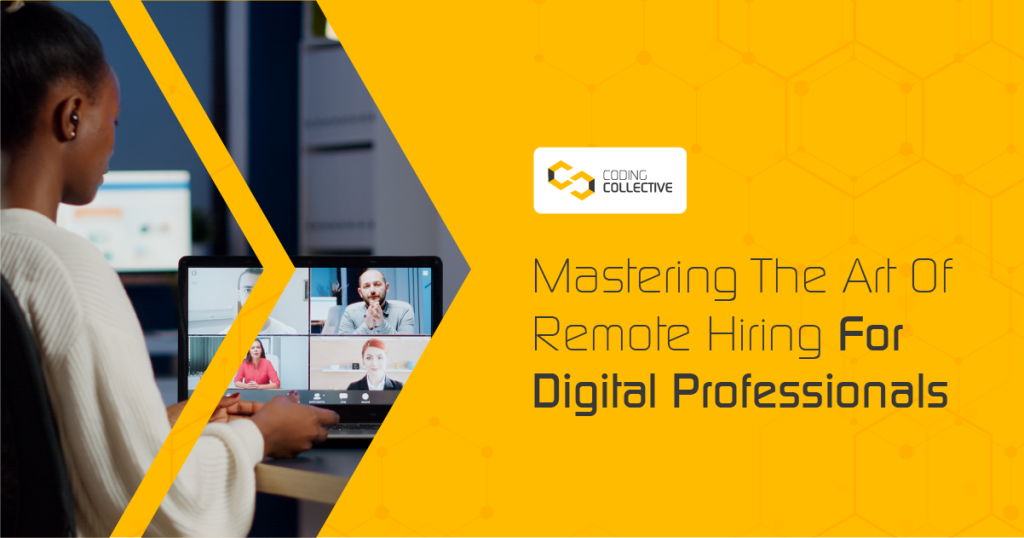
The Pandemic and the increase in global shifts have made remote work a reality for everyone. It has revolutionized the way companies hire and collaborate with digital professionals. As technology continues to advance, businesses are increasingly recognizing the benefits of remote hiring, which expands their talent pool and allows for greater flexibility. However, remote hiring comes with its own unique challenges. Mastering the art requires a few skills that may come in handy when hiring a digital professional.
Define Your Remote Hiring Strategy:
We call it doing some research before hiring what you need. To successfully hire remote digital professionals, it’s essential to establish a clear remote hiring strategy. Start by defining the specific roles and skill sets you’re looking for, considering both technical expertise and the ability to thrive in a remote work environment. Determine the level of experience required and identify the key qualities that align with your company’s culture and values. This strategy will serve as your roadmap throughout the hiring process.
Create Compelling Job Descriptions:
There’s skill involved in having everything you want and clearly listing it down so it matches all the technical requirements you can and definitely would need in a job as well as the skills that would be good to have but can be learned on the job. Crafting compelling job descriptions is crucial when hiring remote digital professionals. Clearly outline the responsibilities, skills required, and expected deliverables. Highlight the benefits of remote work, such as flexibility and work-life balance, to attract top talent. Emphasize your company’s remote-friendly culture and commitment to remote employees’ success. Ensure that your job descriptions stand out and convey a compelling story that resonates with potential candidates.
Implement Effective Screening Techniques:
It’s easier to screen a person when they are sitting with you. You can watch how they are and in person makes the whole process more trustworthy. But when screening candidates for remote positions, it’s important to go beyond traditional assessments. Consider implementing remote-specific screening techniques to evaluate their suitability for remote work. Conduct virtual interviews to assess their communication skills, self-motivation, and ability to work autonomously. Utilise video calls, technical assessments, and behavioral questions to gain a comprehensive understanding of each candidate’s qualifications and remote work capabilities.
Evaluate Remote Work Experience:
It’s usually said that a person who works better in the office definitely works better in the office and an individual suited to a remote job finds it tougher to go to the office. So this is a good brownie point for an individual who has a protocol in place when it comes to remote work. Prior experience with remote work is a valuable asset for digital professionals. When evaluating candidates, pay attention to their previous remote work experience. Look for individuals who have demonstrated success in remote settings, as they are likely to be self-disciplined, adaptable, and effective communicators. Consider candidates who have experience collaborating with remote teams or working on projects with minimal supervision.
Emphasise Communication And Collaboration Skills:
When working remotely, communication is the backbone that ensures the process is smooth. Remote work heavily relies on effective communication and collaboration. During the hiring process, assess candidates’ communication skills through interviews and written exercises. Look for individuals who are proactive in seeking clarity, responsive in their communication, and comfortable using collaboration tools. Strong communication and collaboration skills are essential for seamless remote work and maintaining team synergy.
Test Technical Infrastructure And Tools:
There are some tools that you will use if you are working with a remote team. Such tools are very common in the remote working atmosphere. To ensure a smooth remote work experience, evaluate candidates’ familiarity with remote work tools and their technical infrastructure. Assess their proficiency with video conferencing platforms, project management tools, and collaboration software. Candidates who are already adept at utilizing these tools will require less onboarding and can seamlessly integrate into your remote work environment.
Prioritize Cultural Fit In A Remote Setting:
Every company has a culture, some have a culture where they handhold their employees like to have that control when working. On the other hand, others focus on results and trust that the employees will do everything to get those results and understand where the problem is coming from and do their bit to help them. This culture fit is mandatory to understand when hiring remote talent. While the cultural fit is important for any hiring decision, it holds even more significance when hiring remote digital professionals. Look for candidates who align with your company’s values, mission, and work culture. Evaluate their ability to adapt to a remote work environment, demonstrate self-motivation, and contribute positively to virtual team dynamics. Building a cohesive and engaged remote team starts with selecting candidates who thrive in your company’s culture.
Provide A Comprehensive Onboarding Process:
Once you’ve successfully hired remote digital professionals, a well-designed onboarding process is crucial for their success. Provide comprehensive training materials, access to necessary tools and resources, and a clear outline of expectations. Encourage open lines of communication and set up regular check-ins to address any concerns or challenges. A solid onboarding process will help new hires feel supported and integrated into your remote team.
While remote hiring seems very attractive as you save up on a lot of costs when hiring remotely, it might seem like a lot especially if you are just starting out as a professional hiring remotely. This is where a coding collective has an industry market expert that sits down with you, understands your requirement, and takes care of the entire process from making an effective job description to finding the cultural fit. Mastering the art of remote hiring for digital professionals requires a thoughtful and well-executed approach. By defining your remote hiring strategy, creating compelling job descriptions, implementing effective screening techniques, and prioritizing communication, collaboration, and cultural fit, you can build a successful remote team that drives digital success. Why does it yourselves when you can trust the expert and get your talent at the right price with next to no hard work?

